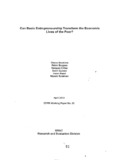Can basic entrepreneurship transform the economic lives of the poor?
Citation
Bandiera, O., Burgess, R., Das, N. C., Gulesci, S., Rasul, I., & Sulaiman, M. (2013, April). Can basic entrepreneurship transform the economic lives of the poor? Research Reports (2013): Economic Studies, Vol - XXX, 1–64.Abstract
Does the lack of capital and skills drive occupational choice and poverty? We provide evidence from a
large scale and long term randomized control trial of a programme that simultaneously provides assets
and training to the poorest women in treatment communities in rural Bangladesh. The evaluation tracks
7000 eligible women over four years in treatment and control communities. We find the programme
transforms the occupational choices of the poor: treated women spend 92% more hours in selfemployment
activities, and 26% less hours in wage employment. This shift from insecure wage labour to
self-employment is associated with a 38% increase in earnings. The eligible women, who were largely
asset-less and illiterate agricultural labourers at baseline, overtake the near-poor and begin to close the
gap with middle class women on dimensions such as occupational choice, regularity of earnings,
household per capita expenditure and happiness. Inculcating basic entrepreneurship, where the most
disadvantaged women take on business activities which hitherto had been the preserve of non-poor
women, is shown to be a powerful means of transforming the economic lives of the poor.

